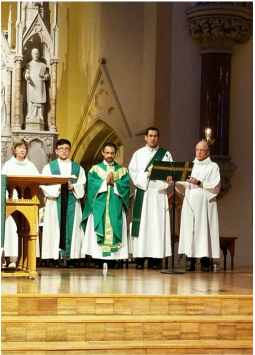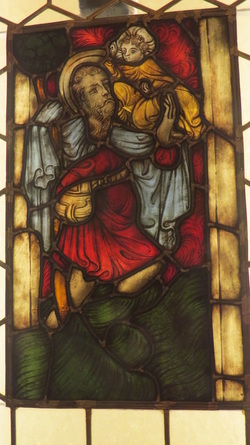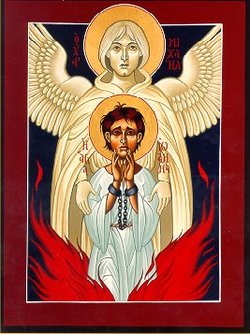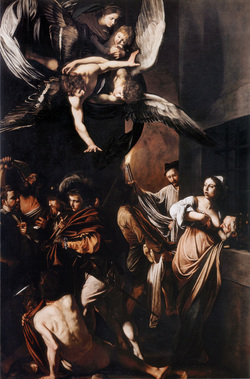 I have written previously about prayer, in fact, many times. Sometimes it has been about its power and other times about ‘how-to’ basics. It is time to return to this topic, especially because this week I read more than once about those who say prayer is ineffective or that prayer is not enough. I would strongly disagree with those two statements: the problem is not with prayer, but in our idea of what prayer is and what it does. Prayer is first and foremost part of a relationship, and as in any relationship it is based on mutuality, trust, and dialogue which therefore includes listening. There will also be mystery. We are often a mystery to our own self, and so it is no surprise that in a relationship the other is also a mystery. This is especially so with God. Though He has revealed a lot about Himself, He is vastly more mysterious than any other and His wisdom is far beyond anything we can grasp. Therefore because God is mystery, prayer involves faith. If we do not truly have faith in God, then we cannot trust our own prayer. And for prayer to be truly effective, it must change our own heart and move us outward. As Pope Francis once said, “You pray for the hungry. Then you feed them. That's how prayer works.” Prayer is everyone’s hotline to God. It is not something that one person has more of than another, nor are some people more readily listened to by God; God hears us all equally. While some people are rather eloquent, the best prayer does not require us to be so. It is the heartfelt and sincere prayer which is ‘best’, such as “God help me/us/them.” God is not judging the quality of our grammar or the poetry of our language, but rather He hears what is articulated and also what is beyond words. Prayer is not getting what we want when we want it, no matter how ‘great’ what we desire might be. If our prayer seems to go unanswered, it may be because there is too much complexity involved, all of which is beyond our understanding.  We need to remember that God never promised that we would be free of suffering. God does not cause evil or suffering and God does not condone it. But He does allow it because it is part of the freedom given all things. Rather than forcing us to be puppets that are only able to do what He wants, God gave the gift of freedom, which means that wickedness can be chosen as well as good. That is simply the way it is. Because of sin, Jesus suffered and died to offer a way into heaven and He is continuing to battle malevolent forces through the efforts of good people. And this is why prayer is so important: it changes our hearts and it enables us to be the hands and feet of Jesus in the world today. Prayer gives us immense power. That is how prayer works. Through prayer, what we always receive from God is the power to endure, the power and grace to work for justice, and the power to affect the lives of others. Think about a time when someone told you they would pray for you. What was the effect of such a promise? I know that whenever someone says this to me I feel more confident regarding whatever my need might be. I also feel less alone and more empowered just by knowing that someone cares enough to enter into my mess, and that because of their prayer I have a deeper sense of God’s presence, of God holding me close, and of God giving me the strength to endure whatever it is I am facing. In short, when someone tells me they will pray for me it inflames my trust in God. That is how prayer works.  Being people of prayer does not mean we are to become passive like a doormat. Rather, Jesus taught that to be Christian means to fight evil with mercy and love, not with violence. One of the many gospel passages which support this is when Jesus said, “Behold, I am sending you like sheep in the midst of wolves; so be shrewd as serpents and simple as doves. But beware of people, for they will hand you over to courts and scourge you….” (Matthew 10:16-25; please read this entire passage.)* Jesus was basically saying that anyone who is truly His disciple, living as He taught, will be subject to attack, so we need to be prepared for how we want to respond. This means we are to be alert for danger especially at the hands of enemies. But our response is to be one of peace and respect. The Holy Spirit will be with us, speaking for us, so we will know how to use our God-given talents with courage and hope. Truly, all of Jesus’ teaching is about loving responses, working for justice, spreading the gospel, helping the poor, reaching out to the imprisoned, sick and marginalized, but none of it is sugar-coated. One has only to read the gospels to know that we are not meant to sit around and do nothing. Christianity is a religion of doing and working, not of passivity. Therefore, our prayer is meant to help us to have the courage, the grace, and the discernment to know how to proceed given the circumstances of our lives. Our prayer will help us to know when we are to involve ourselves in organizations which work for peace, or to give money to causes that are consistent with the gospels, or to be a presence in our community just by being a witness to our faith, and it will always help us to vote in ways consistent with gospel values. That is how prayer works.  St. Theophan the Recluse († 1894) wrote: “The prayers of the poor are powerful. You, too, go and multiply your alms: wipe the tears of the unfortunate, shelter if you can the destitute. The prayerful moans of the impoverished reach heaven and pass through the heavens of heavens.” This is not just about being monetarily poor, but it includes all of us who are spiritually poor from time to time, such as when a disaster or tragic event takes place, when we are stunned, mourning, or outraged at what we have seen and heard. Therefore it is important to recognize that our prayer is powerful especially when we feel the most powerless and vulnerable. Some may ask why the prayers of many seem to go unanswered when they are praying for safety and it does not happen. Do we definitively know that their prayers actually went unanswered? Their lives had meaning without a doubt. We can look to the many martyrs throughout history and know that while some seemed to embrace martyrdom, many did not. One of my favorite saints is such a one: St. Joan of Arc did not embrace martyrdom at all, crying out to Jesus to save her as she was consumed by flame. Her life had great meaning and effect, even though she was an unschooled French woman who died very young. While not everyone who dies in a tragic, violent way will be remembered as vividly as St. Joan, they are our brothers and sisters, and they are part of the fabric of our lives whether we recognize it or not. Prayer is effective and we need it now more than ever. We need to listen, discern, and wrestle with angels like Jacob if need be, but in the end the greatest power we have is the love, mercy, and compassion which can only come to us from God. That’s how prayer works.  May we find our way to God in prayer, trusting in His promises! May we utilize the gifts of faith, hope, and love, trusting that God hears our prayer, no matter how He seems to respond! May we have the courage to oppose injustice and hatred both in our prayer and in our actions! May we support all our brothers and sisters in prayer which moves us outward to them! May we persevere in our desire to grow in holiness, not so much for our own sake, but in order to work at building the Kingdom of God! May we continue to live this Year of Mercy with active gratitude for God’s mercy by making a special effort at becoming mercy! And may we learn to have the heart of Jesus, returning love for hate and kindness for contempt! Let us continue to meet in the Heart of Jesus! Peace! ©Michele L. Catanese * Here is the link to the passage from Matthew which I quoted: https://www.bible.com/bible/463/mat.10.16-25.nabre I also encourage everyone to pick a Gospel and read it end to end. I would suggest Luke since his gospel has prayer and reaching out to the outcast as two of its main themes. The photographs are all my own except this first one, which was taken by Mary Solcher. It is from the Mass of Thanksgiving presided over by newly ordained Fr. Roy Joseph, SJ. The deacon beside him was leading the congregation in the Prayers of the Faithful. I chose this because of the fervor of the prayer at this Mass and also because of the very moving homily which Fr. Roy gave which included the topic of mercy. (Thanks for letting me use this wonderful photo, Mary!) Next is a photo I took in Salzburg, Austria. There was a display of stained glass inside our hotel which was actually a historic building. This glass depicts St. Christopher carrying Jesus across a river. According to legend, Christopher (from the Latin, Christophorus which translates to 'Christ-bearer') carried the Christ Child across a river, and when asked why He was so heavy, Jesus responded that He carried the weight of the world on His shoulders. I chose St. Christopher, though he is shrouded in legend, because when someone tells us they are praying for us, it is as if they have begun to carry us and our burdens. It is an act of love to pray for a friend and yes, even an enemy, as Jesus calls us to do. You can read about St. Christopher by clicking on this link: http://www.catholic.org/saints/saint.php?saint_id=36 Next is a photo of a hang-glider which I took at the Zugspitze, the highest mountain in the German Alps. It takes a lot of courage and faith to hang-glide in a place like the Alps. I chose this photo because sometimes we have to do something that feels a little dangerous because of our commitment to prayer, and ultimately to Jesus Christ. It is dangerous to love, to offer mercy, and to live Christian values in a world which is often hostile to them. But it is what Jesus asks of His followers, and He sends the Holy Spirit for us to glide upon and to empower us. We are safe with the Spirit surrounding us. Next is an icon called St. Joan of Arc with St. Michael the Archangel, by Fr. William Hart McNichols. I love this icon because St. Joan is the patron I chose for my Confirmation and I am named for St. Michael, therefore it is incredible to have both my patrons in one icon. But I selected this because it depicts the terror of Joan as she endured the fire, yet St. Michael is separating the flames which are like sails on either side of her. He was with her in the flames, comforting her. For those who feel like they are in the flames right now, St. Michael will surround and comfort you, too. This icon can be found at http://fineartamerica.com/featured/st-joan-of-arc-with-st-michael-the-archangel-042-william-hart-mcnichols.html. If you go to the site, you can purchase a copy of this icon, which is available in many different formats. Information on St. Theophan the Recluse: http://oca.org/saints/lives/2016/01/10/100147-st-theophan-the-recluse-the-bishop-of-tambov Finally, the last image is a painting by Caravaggio called The Seven Acts of Mercy. I chose it because Pope Francis referred to it as one of his favorite paintings and therefore it tied in with the theme of this post as well as the frequent repetition of the Pope's words: "That's how prayer works." It depicts the action to which prayer moves us. I am providing a link to an article about Caravaggio and this work: http://ncronline.org/news/art-media/caravaggio-masterpiece-mercy-calls-pope-francis-across-centuries
Linda Dalferes
6/20/2016 09:18:41 pm
Thank you, Michele.
David
6/26/2016 02:57:09 pm
Dear Michele, Comments are closed.
|
Heart Speaks to Heart
|

 RSS Feed
RSS Feed

